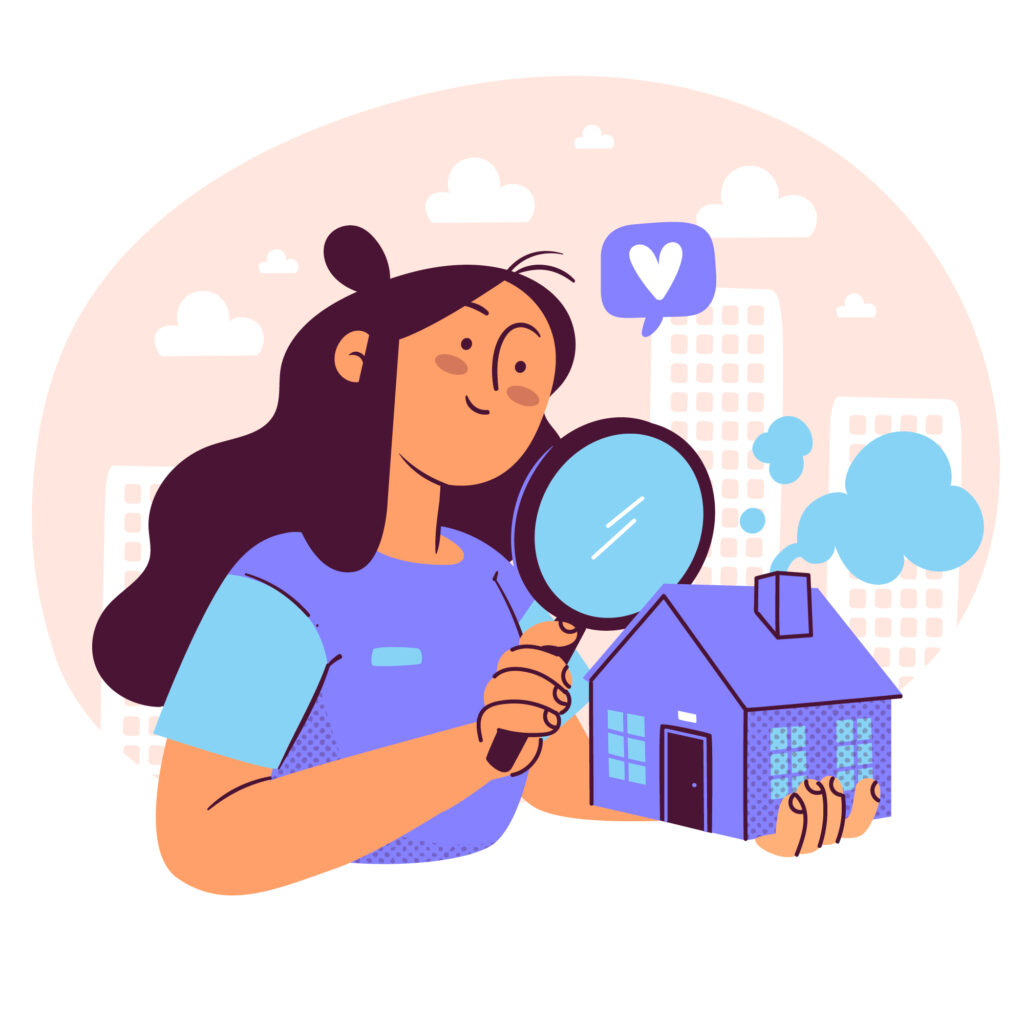Introduction
Buying your first home is one of life’s most exciting milestones. It’s a significant step toward financial independence and stability, but it can feel overwhelming if you’re unsure where to begin. Whether you’re dreaming of a cozy suburban house or a chic urban apartment, this guide will walk you through every step of buying your first home, ensuring you make informed decisions and avoid common pitfalls.
Table of Contents

Understanding Your Financial Situation
Assessing Your Current Finances
Before you start house hunting, it’s essential to assess your financial situation. Review your income, expenses, and savings. Creating a detailed budget is a key step in buying your first home, helping you determine how much you can realistically afford to spend on a property.
The Importance of a Good Credit Score
When buying your first home, your FICO score plays a crucial role in securing a mortgage. A higher score can help you obtain better loan terms and lower interest rates. If your credit score needs improvement, prioritize paying down debts and making timely payments before applying for a mortgage.
How to Save for a Down Payment
Saving for a down payment when buying your first home can feel daunting, but it’s crucial. Aim to save around 20% of the home’s price to avoid paying private mortgage insurance (PMI). Open a dedicated savings account and consider automating your savings to make the process smoother.
Determining Your Budget

How Much Home Can You Afford?
Your budget will dictate the homes you can consider. Lenders typically recommend that your monthly housing costs (including mortgage, taxes, and insurance) should not exceed 28% of your gross monthly income. Use this guideline to calculate your budget.
Using Mortgage Calculators
Mortgage calculators are essential tools when buying your first home. They help you estimate monthly payments by adjusting loan amounts, interest rates, and terms. Use these calculators to explore different scenarios and determine a payment range that fits your budget.
Hidden Costs to Consider
When buying your first home, remember that the purchase price is just the beginning. Home ownership also brings additional costs like property taxes, homeowner’s insurance, utilities, and maintenance. Be sure to factor these into your budget to avoid any surprises.
Exploring Loan Options
Types of Mortgages Available
There are several mortgage options available, each with its pros and cons. The most widely recognized are standard mortgages, FHA credits, VA advances, and USDA advances. Research each option to determine which best suits your needs.
Fixed-Rate vs. Adjustable-Rate Mortgages
When buying your first home, you’ll need to decide between a fixed-rate mortgage, which offers a consistent interest rate throughout the loan term, and an adjustable-rate mortgage (ARM), where rates can fluctuate. Consider your long-term plans and financial situation when making this choice.
First-Time Homebuyer Programs
Many first-time homebuyer programs offer favorable loan terms, lower down payments, and even grants. Explore federal, state, and local programs that might make your home purchase more affordable.
Getting Pre-Approved for a Mortgage
The Pre-Approval Process
Getting pre-approved for a mortgage shows sellers that you’re a serious buyer. During this process, the lender will review your financial information and credit history to determine how much they’re willing to lend you.
Benefits of Pre-Approval
A pre-approval letter can give you an edge in a competitive market. It demonstrates to sellers that you have the financial backing to follow through on an offer, making you a more attractive buyer.
Common Mistakes to Avoid
Avoid making large purchases, changing jobs, or applying for new credit before closing on your home, as these actions can affect your pre-approval status.
Finding the Right Real Estate Agent
Why You Need a Real Estate Agent
A knowledgeable real estate agent can guide you through the home-buying process, from finding properties to negotiating the best deal. Their expertise can save you time, money, and stress.
Tips for Choosing the Right Agent
Look for an agent with experience in the area where you want to buy. Check their credentials, read reviews, and interview a few agents before making your decision.
Understanding Agent Fees
Real estate agents typically earn a commission based on the home’s sale price, which is paid by the seller. However, it’s important to clarify any fees upfront to avoid misunderstandings.
Searching for Your First Home

Creating a Wishlist: Needs vs. Wants
Before buying your first home, make a list of your needs versus wants. This will help you focus on properties that meet your essential criteria without getting sidetracked by less important features.
How to Research Neighborhoods
When buying your first home, the neighborhood is just as important as the house itself. Research areas that match your lifestyle, considering factors like school districts, commute times, and local amenities.
Attending Open Houses and Home Tours
Open houses and private home tours give you the opportunity to see properties in person. Take notes, ask questions, and imagine yourself living in the space to determine if it’s the right fit.
Making an Offer
How to Determine the Right Offer Price
Work with your real estate agent to determine a fair offer price based on comparable homes in the area, the home’s condition, and current market conditions.
The Art of Negotiation
Discussion is a vital piece of the home-purchasing process. Be prepared to negotiate on price, repairs, and closing costs to get the best deal possible.
What to Include in Your Offer
Your offer should include the purchase price, contingencies (like financing and inspection), and your desired closing date. Your agent will help you draft a strong offer.
The Home Inspection Process
Why Inspections are Crucial
A home inspection is a must before closing. It can reveal issues with the property that you might not have noticed during your tour, potentially saving you from costly repairs down the road.
What to Expect During a Home Inspection
During the inspection, a professional will examine the home’s structure, systems, and components. You’ll receive a detailed report outlining any issues found.
How to Handle Issues Found in the Inspection
If the inspection uncovers problems, you can negotiate with the seller to fix them before closing or ask for a price reduction to cover the cost of repairs.
Closing the Deal
Understanding the Closing Process
Shutting is the last move toward the home-purchasing process. You’ll survey and sign the important reports, pay shutting costs, and get the keys to your new home.
What to Expect at the Closing Table
At the closing table, you’ll sign several documents, including the mortgage agreement and the deed. Ensure you comprehend what you’re marking prior to putting pen to paper.
Closing Costs and How to Prepare for Them
Shutting costs normally range from 2% to 5% of the home’s price tag. These can include loan origination fees, title insurance, and recording fees. Budget for these costs ahead of time to avoid last-minute surprises.
Moving Into Your New Home
Planning Your Move
Plan your move ahead of time to make the change as smooth as could be expected. Hire movers, schedule utilities, and start packing early to avoid stress on moving day.
Tips for a Smooth Moving Day
On moving day, stay organized by labeling boxes, keeping important items accessible, and having a plan for where everything will go in your new home.
Setting Up Your New Home
Once you’re moved in, take the time to set up your new home. Unpack essentials first, arrange furniture, and start personalizing your space.
Maintaining Your Home
Regular Home Maintenance Tasks
Owning a home comes with ongoing responsibilities. Regular maintenance tasks like cleaning gutters, changing HVAC filters, and inspecting your roof can prevent costly repairs.
Tips for Long-Term Property Value Preservation
To maintain your home’s value, keep up with regular maintenance and consider making updates that enhance its appeal, such as landscaping or upgrading appliances.
Preparing for Future Home Improvements
Over the long run, you might need to make upgrades to your home. Start planning and budgeting for these projects early to ensure they align with your long-term goals.
Conclusion
Buying your first home is a significant milestone, and while the process can be complex, it’s also incredibly rewarding. By following this guide, you’ll be well-equipped to navigate each step with confidence. Remember, preparation is key, and with the right resources and support, you can turn the dream of homeownership into a reality.
Frequently Asked Questions
What is the Best Season to Purchase a Home?
Spring and summer are popular times to buy, but there are advantages to shopping in the fall and winter, such as less competition and potentially lower prices.
How Long Does the Home Buying Process Take?
The process can take anywhere from a few weeks to several months, depending on various factors like market conditions, loan approval, and how quickly you find the right home.
Would it be a good idea for me to Purchase a Home Without a Realtor?
While it’s possible, having a real estate agent on your side can make the process smoother and help you avoid costly mistakes.
Can I Buy a Home with Bad Credit?
Yes, but it may be more challenging. Consider improving your credit score before buying or explore loan options designed for buyers with lower credit scores.
What Should I Do if My Offer is Rejected?
Don’t be discouraged. Work with your agent to understand why the offer was rejected and consider making a stronger offer or looking for other properties.

